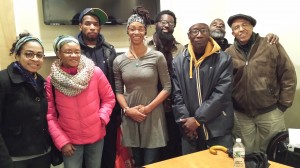Project Showcase: History and Reconstruction
05 March 2015 – Phillip Seitz

History and Reconstruction project storyteller Denise Valentine (center), psychologist Dr. Thomas Gordon (right), members of the cohort, and friends. Photo credit: Courtesy of Phillip Seitz
How can public historians and their audiences come to terms with the traumatic and ongoing legacies of racism and slavery in the United States? This is the question motivating a project I’m currently working on in Philadelphia with a group of ex-offenders, ages 21 to 72. The project is a collaboration with Reconstruction Inc., a grass-roots group (William Goldsby, chair) that supports returning citizens as well as youth at risk and lifetime prisoners.
The Pew Center for Arts and Heritage has funded us to match academic historians in the field of African American history with a group of black men for the purposes of personal transformation and organizational growth. In practice, this means various historians have come in to talk to the group about topics such as the early laws of Virginia and how the colony worked to separate white settlers and Africans from each other and to enforce evolving regulations controlling black behavior. In this case, the purpose was to look at the origins of state control of racial issues and of structural racism. We had three other sessions as well, focusing on responses to General Sherman’s Special Field Order 15, the post-Civil War pursuit by African Americans of land and autonomy, and how historians’ interpretations of the past may change over time.
This experience was disturbing for our participants–especially the younger ones who didn’t have much exposure to African American history. Accordingly, we also provided group counseling with an African American psychologist to help people sort through their anger, confusion, and curiosity, as well as any personal issues this psychically charged material might bring up.
The participants have also worked with a black storyteller, who has provided some excellent, culturally grounded ways they can take their newfound awareness and put it into action. Soon they’ll be going out to speak with members of their community and are excited about this possibility.
- To hear from others involved in the “History and Reconstruction” project, click here.
To provide measures of the effects of the project on participants, the Positive Psychology Department at the University of Pennsylvania is doing pre- and post-testing with a variety of happiness and self-sufficiency instruments (the post-testing is going on now). Everybody seems to agree that the program was tough but that they’ve come through much better grounded, able to interpret their environment and its risks, and simply energized. It has also been a fulfilling experience for me as a white person to work with and learn from African Americans. The takeaway for the project is that telling people about the past can be very jarring–even traumatic–but that having support in the form of open discussion and a guide to action makes it possible to absorb the new material and thrive at the same time.
~ Phillip Seitz has managed history programs for more than 25 years, including at the Smithsonian Institution and most recently at Cliveden, a National Trust Historic Site. He has an MA in American Civilization from George Washington University and recently published Slavery in Philadelphia: A History of Resistance, Denial and Wealth. Reach him at [email protected].




Too awesome! Congrats everyone!!